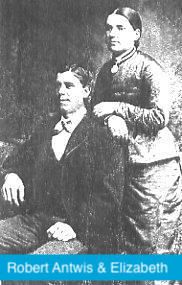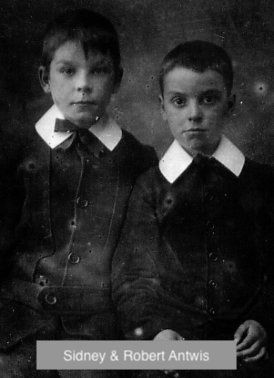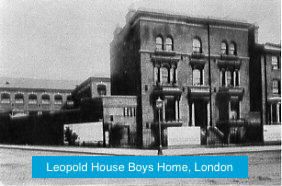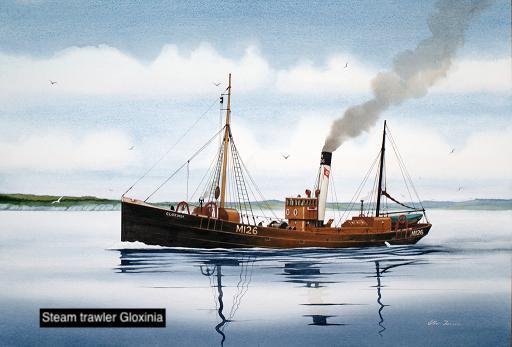The Family of Robert Wallace Antwis and Elizabeth Luchesi
Robert Wallace Antwis was born in 1859 in London, the son of Samuel Antwis of Frodsham in Cheshire, and Elizabeth, nee Rees. (After Samuel’s early death, Elizabeth married Nathaniel Gillard.
Robert was a steward in the Merchant Navy on the St John’s, Newfoundland, Canada route.
On 16th June 1884 he married Elizabeth Annie Luchesi at St George’s Street Presbyterian Chapel, Shankhill, Antrim, Ireland. Elizabeth was born in Manchester in 1835 and was the daughter of Dominico Luchesi, a grocer, born 1835 in Lucca in Italy, and Margaret born 1835 in Belfast.
By the time of the 1891 census they were living at 12 Jubilee Terrace, Steynton, Milford Haven, Pembrokesire, Wales with their children Marian Daisy, born 1885; Albert born 1887 and new-born Robert Luchesi Antwis. Dominico and Margaret were living with them. Robert is not shown so was, presumably, at sea.
Their fourth child, Sidney Walter, was born in 1893 at 7 Commercial Row, Pembroke Dock, Pembrokeshire.
Great tragedies befell the Antwis family.
Elizabeth died from cancer on 19th July 1901.
Robert was also very ill, in Cardiff Royal Infirmary. He and Robert Junior, were taken in by Robert’s sister Agnes Seaborne. Sidney was with another aunt- Ada Allen. Daisy and Albert were with their paternal grandmother Granny Gillard.
Robert died from chronic nephritis in Greenwich Seaman’s Hospital in 1902.
Before his death, Robert signed the two youngest boys – Robert Luchesi and Sidney Walter into the care of Dr Barnardo’s.
It is sad that he felt the need to do this, but Aunt and Uncle Seaborne had 3 children of their own. Aunt and Uncle Allen, who lived in Chatham, Kent, many miles from the rest of the family, had two children both described as ‘cripples.’ Granny Elizabeth Gillard was a 67 year old widow still working as a monthly nurse. Dominico was a widower, whereabouts unknown.
Robert Luchesi, then aged 11 and Sidney Walter, aged 10, were placed at Barnardo’s Leopold House in Burdett Road, East London in June 1902. Sidney will have had his 11th birthday in Leopold House on 12th June.
In August they went to foster parents in Hampshire.
On 19th March 1903 the two boys were sent by Barnardo’s to Canada as part of a scheme for sending children in their care to be resettled in the Colonies.
They sailed on the SS Canada, arriving at Halifax on 29th March 1903 along with 286 other boys.
The two boys were separated when they arrived.
Sidney was boarded with Mr James Weir of Utterson, Ontario. Sidney was described as a bright, fine little lad.
Robert was placed in Stratford, Ontario, then in Devizes London Township.
In 1904, Sidney was placed with Mr Thomas A. Maxwell of Birr, London Township.
In 1905 Sidney was still with the same employer and was said to be useful on the farm and doing well in every way. However, his employer wrote that Sidney was anxious to leave and go to a place near his brother, Robert.
In 1908, aged 17, Sidney was employed by Mr G.W.Garrett of Granton, Ontario. He was described at this time as ‘excellent.’
In 1909 he was employed by Ernest Braithwaite of Devizes, Ontario where he remained at least until June 1911.
In 1910, Sidney wrote to Barnardo’s that he was taking up a homestead in the West and he and his brother were going to work it between them. He enclosed his bank book and asked if he could have the wages Barnardo’s were holding in trust for him to help pay for stock etc.
Barnardo’s replied that they felt Sidney should only draw enough money to pay for his expenses to get to the North West and leave the balance in the bank until they had obtained their homestead.
In 1917 it was recorded that Sidney had gone to the North West some six years previously.
It was also recorded that he had married there and, in 1914, taken his wife to England. This is not true – he did return to the UK but he did not marry in Canada.
Robert did marry, however, and stayed in Canada, later moving to North America.
Sidney came home on RMS Victorian from Montreal & Quebec, the first large civilian ship propelled by steam turbines, on 21st October 1913 to Liverpool.
He enlisted in the Welch Regiment, when WW1 broke out, in Swansea on 13th Augusr 1914.
He kept a war diary and this is transcribed on another page.
His war record is outstanding, including winning the military medal and is detailed on another page.
He married Winifred May Harse of Oxford after the war and had three daughters and two sons. He never returned to Canada.
Daisy Antwis married Herman Westenborg. Sidney's son, Peter, recalled - 'They ran a pub outside Milford Haven Dock gates- the Railway Hotel. This was a prosperous pub but Daisy had one burden to cope with - Herman. He drank like a fish! Daisy had a baby at an early age, about 19. The pub had a dubious reputation in Milford. They had a parrot in a huge cage which swore like a trooper - it often had to be put under the counter to stop it swearing.
Daisy's daughter, Ena, married a fairly unsuccessful trawler skipper. They were set up in the Horse And Jockey pub at Steynton by Daisy. Ena suffered from ill-health. The family said she had fallen down a drain as a child and that caused her health problems.
Daisy's daughter Elsie was very good looking and spoilt by her parents. She married a swimming coach. She wanted to swim the Channel but the family reckoned she never did. She came into the pub once and said she had just swum from Ireland to Gelliswick but no-one believed her!
When Peter's brother, Colin returned from living in Oxford with his Aunt, the first thing he did was to go down to the docks and swim behind a trawler to St Anne's Head. He was brought back by the Coastguards. He said he did it to 'show up the Westenbags as idiots'. He was a very good swimmer and about 13 years old at the time.'
Albert Antwis died in 1907 aged just 20 in extraordinary circumstances-
From The Pembrokeshire Herald and General Advertiser of Friday 14th June 1907:
Trawler Tragedies.
INQUEST REVELATIONS AT MILFORD HAVEN.
When the steam trawler "Gloxinia", of Milford, was fishing on Saturday off the Smalls Lighthouse the fishing gear caught fast, probably in a wreck. The deck hand, Albert Antwist, aged 20, of Milford, was attending to the winch, when the barrel struck him on the head. The Gloxinia put into Milford, and Antwist died at ten a.m.
Mr. John Roberts, the deputy coroner, held an inquest at the Police Station, Milford Haven, on Monday on the body of Albert Antwist. Mr. W. J. Jones represented the owner.
The first witness called was William Reynolds, the skipper of the Gloxinia, residing at Albion Street. He stated that on Saturday, June 8th, they were fishing 25 miles from the Smalls at 12.30 noon. The fishing gear got entangled at the bottom of the net and they proceeded to haul it up. Deceased, Albert Antwist, was at the winch guiding the warp. The ship gave a heavy lurch, and the next thing he saw was the bollard striking the deceased on the head, and he fell backwards. The terrific strain caused the bollard to break. They picked the deceased up and attended to him, and the ship immediately returned to Milford, where they arrived about six o'clock at the mackerel stage. Deceased was unconscious the whole time. Witness was present when he died the same night.
The Foreman: Was the bollard good?— Yes, no breaks or cracks.
By Mr W. J. Jones: There was no blame as far as the bollard was concerned; it was purely an accidental occurrence.
Foreman: Would it not be a support if the bollard had had a stay? Yes.
The Coroner: Are there stays as a rule ?— I have never seen one.
Mr Jones: If there had been a stay could the accident still have happened ?— Yes, it broke quite off the deck.
William Johnson, mate of the ship, corroborated the skipper's evidence, stating that he heard a crack, and saw the gear flying aft and strike deceased on the head. It was not usual for the bollard to have stays. He thought the cause of the accident was the lurch.
By a Juror: The lever was on the starboard side.
By the Foreman: If there had been a new up-to-date winch deceased would not have been standing at the spot. The kind on this ship were, however, mostly in use.
Elizabeth Gillard, 187, Robert Street, said deceased was her grandson. He was 20 last March. She was fetched to his lodgings, and saw him there. He did not regain consciousness.
Dr. Charles Nelson said that about quarter past six on Saturday evening he was called to see deceased at the Mackerel stage. He remained there and ordered his removal. He was unconscious, and was suffering from a rough, jagged wound on the left side of forehead which penetrated to the bone. He could feel a fissure in the skull. There was also a wound at the back of the head on the left side. He saw him at seven and again at nine p.m. Death was due to fracture of the skull and concussion of the brain.
By a Juror: In his opinion the skipper did all in his power under the circumstances.
A verdict of "Accidental death" and in accordance with medical testimony was returned. The jury added a recommendation that in future winches should be fitted with guiding apparatus to the warp. There was no blame attached to any one.



